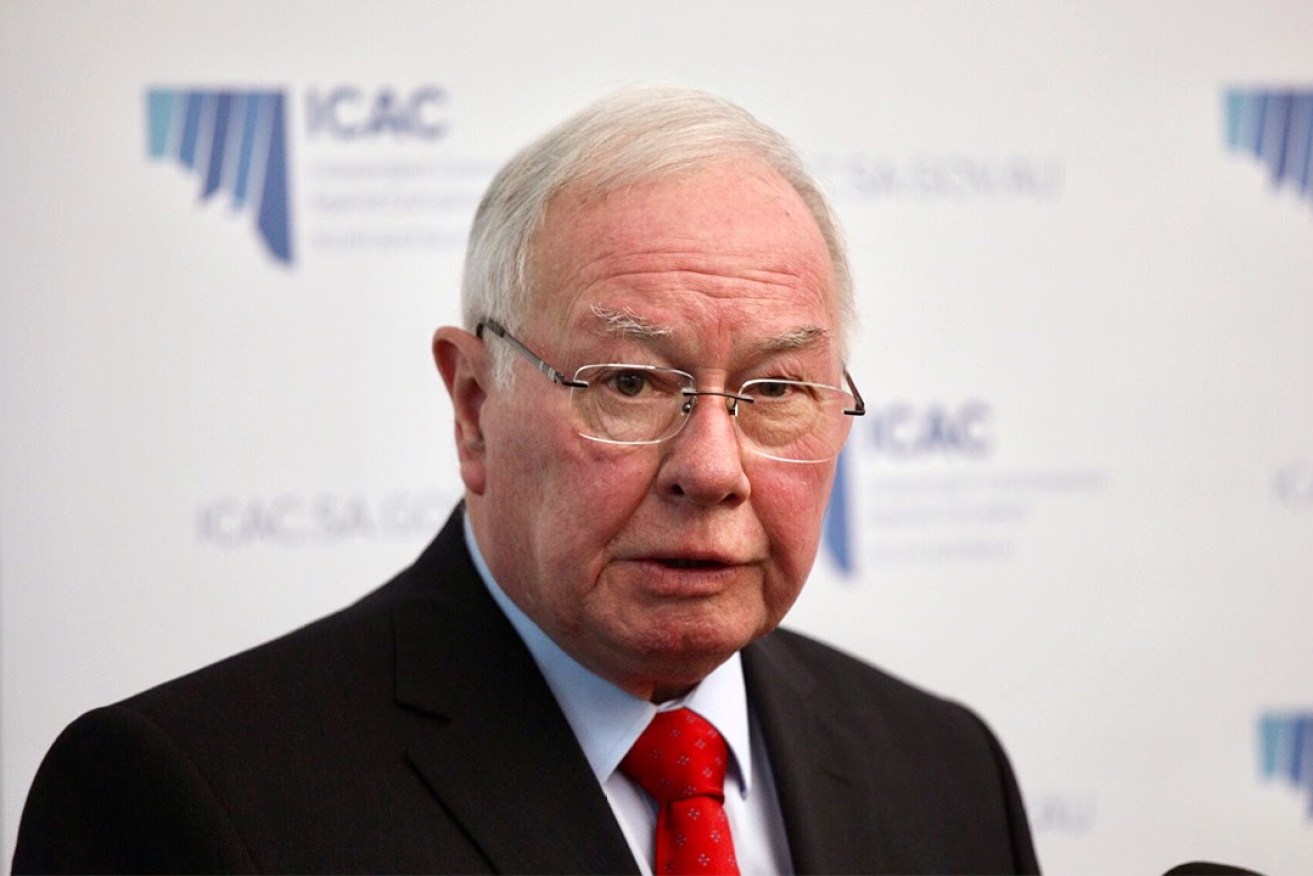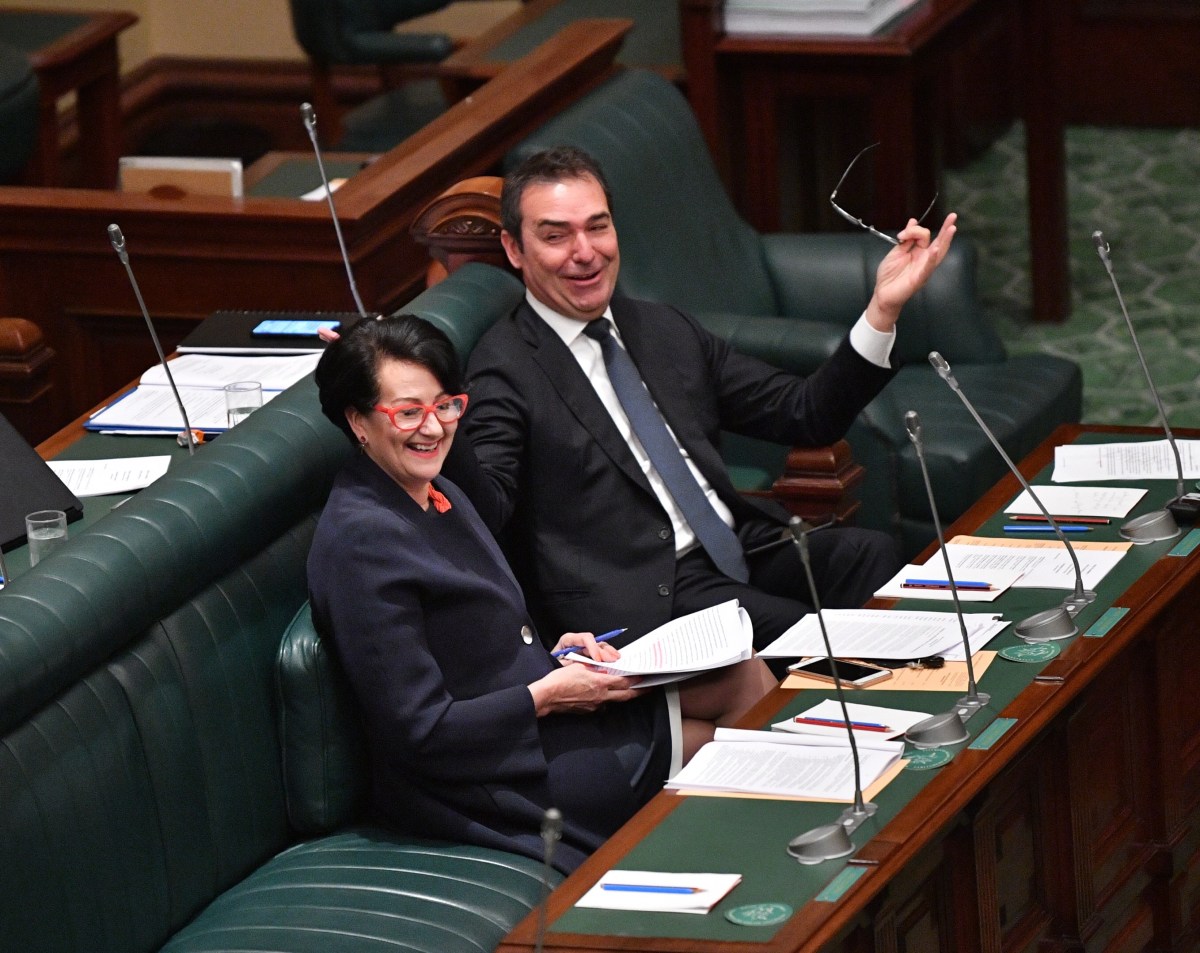Richardson: Chapman breaks the first rule of SA’s ‘Fright Club’
There has always been something of the ‘Fight Club’ dictum about the legislation governing the state’s Independent Commissioner Against Corruption.

Photo: Tony Lewis / InDaily
It’s evidently a convoluted Act: convoluted enough to throw the SA press gallery into collective confusion in recent days, as well as sending the state’s first law officer, Attorney-General Vickie Chapman, off to seek Crown Law advice about her own actions.
But if you’re looking for a handy rule of thumb, I’ll refer you to a few words I wrote on the subject almost four years ago:
“The first rule of ICAC is you do not talk about ICAC. The second rule of ICAC is you do not talk about ICAC.
“You can’t. I can’t. Even the Premier can’t. Only the ICAC commissioner Bruce Lander can talk about ICAC.
“So when he does, it’s kind of a big deal.”
Which, indeed, it is.
Not least when he’s claiming that he expressly told the Attorney-General not to talk publicly about ICAC, mere moments before she took it upon herself to (yep, you guessed it) publicly talk about ICAC.
Thereafter, Chapman steadfastly refused to comment on the matter at all for almost five days after InDaily first reported Lander’s comments – and then, having released a supplementary statement exonerating herself of a legal breach on the basis of Crown Law advice, declined to detail her version of the conversation with the Commissioner.
Thus, one can only ponder how and why this all happened.
Maybe Chapman was suffering some kind of ‘Basil Fawlty syndrome’, reminiscent of when the brusque hotelier’s determination not to mention the war prompted him to inadvertently and disastrously mention it at the earliest opportunity.
Indeed, I can almost hear Chapman counselling colleagues in a Basil-esque conspiratorial whisper when cabinet met earlier this week: “Look, whatever you do, don’t mention the ICAC… I mentioned it once, but I think I got away with it alright.”
https://www.youtube.com/watch?v=yfl6Lu3xQW0
Which, indeed, she has.
In part, because it all transpired on a weekend in which such legal minutiae were drowned out by the AFL Grand Final and an ensuing public holiday, and with two weeks before the matter could be tested in the safer confines of parliament.
In part, too, because some sections of the SA media seem to think the plausible possibility that an Attorney-General has breached an act of parliament is less significant than the hypocrisy of the Opposition making mileage out of it because they happened to introduce the act.
Which is an odd gambit, the logical extension of which is that politicians are henceforth allowed to break any laws that were introduced by opposing parties in government.
Could be fun.
But moreover, she got away with it because the law itself is indeed cumbersome, convoluted and restrictive, and almost everyone – including, as InDaily reported this week, Lander himself – now feels it needs revisiting (although that view is not held, ironically, by Chapman herself).
There is a noticeable sense since the long-awaited ICAC was finally introduced – in a particularly secretive guise, a uniquely SA flourish courtesy of then-Attorney John Rau – that everyone is walking on eggshells.
We could call it SA’s own ‘Fright Club’: everyone is too scared to breathe a word lest they somehow transgress the Act.
Because the first rule of ICAC is you do not talk about ICAC. (And that’s also the second rule, FYI.)

Premier Steven Marshall with Attorney-General Vickie Chapman in parliament. Photo: David Mariuz / AAP
Which makes Chapman’s peculiar statement citing ICAC all the more bizarre, because she didn’t merely tread on eggshells – she determinedly trampled them. And then spent the ensuing days wiping the proverbial egg from her face.
Let’s just take a potted (and dutifully redacted) debrief of recent events.
This all began when Planning Minister Stephan Knoll sent an unsolicited statement to The Advertiser, announcing that two of his executives in Renewal SA had taken leave.
Nothing wrong with that, of course. Some of my best friends take leave.
I point out that the statement was unsolicited, incidentally, not to denigrate The Advertiser (which I do from time to time), nor to deny them the giddy thrill of repeatedly claiming to have ‘revealed’ the story (which, technically, they did), but because it is significant to how this all played out.
Was this rather odd statement made out of necessity in response to media inquiries? Or was it a pre-emptive strike, to absolve the Government of later claims of ‘cover-up’?
The latter, it seems.
But, given the subsequent media headlines were hogged by the sound and fury of Labor attack dog Tom Koutsantonis’s bullish questions to Knoll in parliament last week, perhaps the most quietly revealing query came from his offsider, Tony Piccolo: “Why did you find it necessary to make a public statement when your senior executives are going on leave? How often do you do that?”
To which Knoll was obliged to concede: “This is the first time that I have made a statement in relation to that.”
He went on to say that he had “made the statement that was appropriate for us to say in relation to this issue”.
Which issue was that?
“The issue that the [executives] are on leave.”
And so on.
It’s arguable, of course, that releasing a strange statement and then refusing to say anything more about it is in itself tacitly raising the ghostly presence of ICAC in people’s minds, albeit without breaking the first rule of ICAC (which is, that you don’t talk about ICAC).
Ironically, all the Government’s missteps in the past fortnight seem predicated on trying to hold true to their mantra of openness and transparency – before quickly retreating into closed ranks and opaqueness when everything went awry.
While this has been, to be fair, a situation not of their making, it is quite some accomplishment to then somehow turn it into a complete own-goal.
There are clearly questions about judgment here
Knoll would have been far better served waiting until his estimates hearing to reveal – under privilege – that he was having a little local staffing difficulty, and that there was nothing more he could say on the matter at that time.
He could have credibly argued that he informed the parliament – the most appropriate forum for such an evidently sensitive disclosure – at the earliest possible moment, and would certainly not have endured the same barrage of questions that followed.
Similarly, Chapman thereafter would have been far better served doing what everyone else –including media – was already doing, and following the first rule of Fright Club.
Because, even if we take her secretive Crown Law advice as gospel about whether or not the ICAC Act has been breached, there are clearly questions about her judgment here.
According to Lander – whose recollection of the conversation is the only one we currently have – Chapman agreed not to “include reference to the ICAC [in] any statement made”, but to “say publicly that neither she nor the government could comment”.
“I told her that I would not be making a statement,” Lander insists.
She then went and did the exact opposite – explicitly referencing ICAC.
Lander, reluctantly, did make a statement.
There are credible arguments about the workability of the laws, but that doesn’t mean it’s ok for the Attorney-General to flout them.
And it’s certainly not ok to ask the Commissioner for advice, and then do the precise opposite of what he advises.
Worth noting, too, that Chapman is a serial offender in this sort of kerfuffle.
Just back in August, she elicited a strong response from River Murray royal commissioner Bret Walker, who wrote to her outlining his concern about the timing of a Federal Government High Court challenge to his summonsing of officials, and what that would mean for his reporting timeframes.
Chapman then sent out a media release announcing Walker would be withdrawing his summonses, as he had “advised that he is able to complete his report without pressing for the production of Commonwealth witnesses or documents, as he has received further evidence on which he can rely”.
Walker went about as ballistic as Royal Commissioners are wont to go, demanding an apology for Chapman’s “wrong, discourteous and inappropriate” statement.
“The media release should be completely withdrawn,” he said in a letter to the A-G. “I am owed an apology.”
So yes, Chapman mentioned the ICAC but, like Basil, she seems to have gotten away with it – albeit amid chaos of Fawlty Towers proportions.
But the A-G can probably count herself lucky.
It’s one thing to breach the law on a well-intentioned misstep.
It’s another to thumb one’s nose altogether at the advice of the state’s anti-corruption commissioner.
With any luck, this episode will prompt some re-evaluation of the ICAC Act, but in the meantime, if you can’t understand the law, you can at least follow the first rule of Fright Club.
Namely, that you don’t talk about ICAC.
Tom Richardson is a senior reporter at InDaily.




